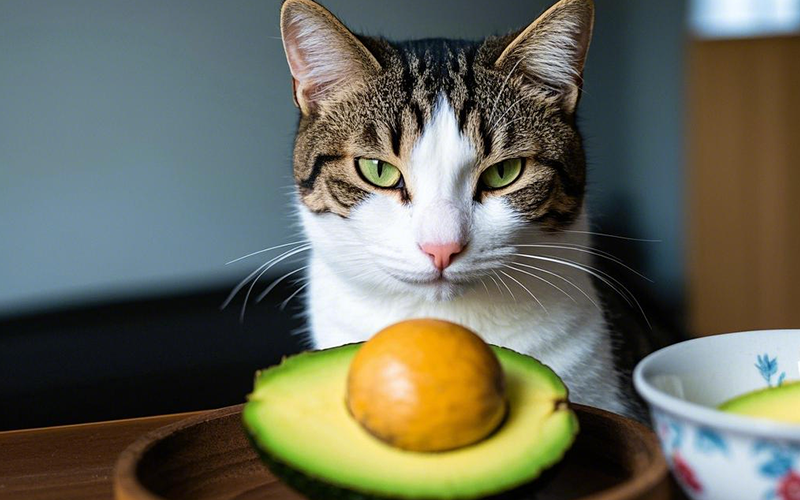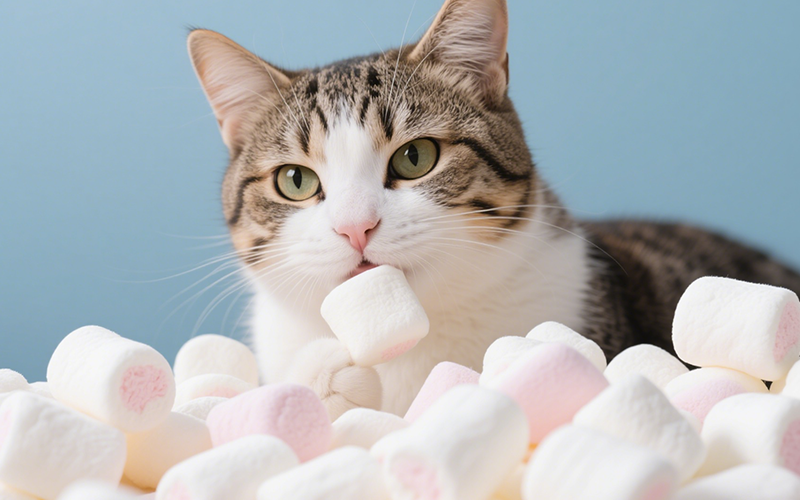Can Cats Eat Avocado? Understanding the Risks and Safety of This Trendy Fruit for Your Feline Friend
- 20 Mar 2025 10:03
Avocados have become a popular superfood for humans due to their rich texture and nutritional benefits 🥑. However, when it comes to cats, the question arises: Can cats eat avocado? With all the buzz around this fruit, is it safe for your furry companion to indulge in a small bite of avocado? Let’s explore the potential risks and benefits of avocado for your cat and what you should know as a responsible pet owner. 😺

The Components of Avocado: What to Know
Avocado is a unique fruit that contains several different parts: the flesh (the green, creamy part), the seed (or pit), and the skin. Each of these parts can have different effects on your cat’s health. While avocados are rich in healthy fats and nutrients for humans, not all parts of the fruit are safe for cats.
1. Avocado Flesh (The Green Part)
The flesh of an avocado, the creamy green part that people love to eat, is generally safe for cats in small amounts. It contains healthy fats, vitamins, and minerals that are beneficial in moderation. However, cats are obligate carnivores, so their diet should primarily consist of animal-based proteins, and avocado should only be an occasional treat rather than a regular part of their meals.
2. Avocado Pit (Seed)
The pit of an avocado is not safe for cats. It can be a choking hazard and may cause digestive issues if ingested. The pit contains a toxin called persin, which can be harmful to animals in large amounts. While cats are less likely to consume the pit compared to dogs (who might chew on it), it’s important to keep the pit out of your cat’s reach. 🚨
3. Avocado Skin
The skin of an avocado is also not safe for cats. It’s tough and difficult to digest, which can lead to gastrointestinal distress. Additionally, like the pit, the skin contains small amounts of persin, which could cause toxic reactions in certain animals. It’s best to avoid letting your cat nibble on the skin of an avocado. ❌
Why Avocados Can Be Dangerous for Cats
While the flesh of avocado is safe for cats in small quantities, there are some risks to be aware of:
Toxicity: As mentioned earlier, avocados contain persin, a naturally occurring toxin. While cats are less sensitive to persin compared to other animals like dogs or birds, it’s still better to be cautious. The flesh contains small amounts of persin, while the skin and pit contain much higher concentrations.
High Fat Content: Avocados are high in fat, which can contribute to weight gain if fed too frequently. While the fats in avocado are healthy for humans, they may not be ideal for cats, who have different dietary needs. Too much fat in a cat's diet can lead to obesity or digestive upset. 🍽️
Potential Digestive Issues: Some cats may have sensitive stomachs, and feeding them even a small amount of avocado can cause vomiting, diarrhea, or other digestive discomfort. 🐾
Signs of Avocado Toxicity in Cats
If your cat consumes avocado (especially the pit or skin), keep an eye out for any signs of toxicity or distress. Symptoms may include:
Vomiting or diarrhea
Loss of appetite
Lethargy or weakness
Difficulty breathing or abnormal behavior (in rare cases)
If you notice any of these symptoms, contact a trusted pet health professional immediately. 🚑
How to Safely Offer Avocado to Your Cat
If you still want to treat your cat to some avocado, follow these guidelines:
Limit the Amount: Only offer a small piece of avocado flesh to your cat, and keep it as an occasional treat. A tiny bite is sufficient—cats don’t need large portions of fruits.
Remove the Pit and Skin: Make sure to remove the pit and skin completely before offering any avocado to your cat. These parts can cause choking or digestive issues.
Monitor for Reactions: After offering avocado, keep an eye on your cat to ensure they don’t have any negative reactions, such as vomiting or discomfort.
Alternatives to Avocado for Cats
If you're looking for healthy treats for your cat, there are many other options that are safer and more suitable for feline diets. Some safe alternatives include:
Catnip: A fun, safe, and stimulating treat for most cats. 🌿
Cat Grass: Helps with digestion and provides a nutritious snack. 🌾
Cooked Chicken or Fish: Lean meats are great protein sources that cats love. 🍗🐟
These alternatives provide healthy nutrients without the risks associated with feeding your cat avocado. 🐾
How PettureX Can Help with Your Cat’s Health
If you’re ever uncertain about whether a food is safe for your cat, PettureX is the perfect solution! 🐱💻 With 24-hour online consultations and pet image recognition, PettureX provides instant advice and expert-like guidance to help keep your cat safe and healthy. Whether it's food-related questions or any other concerns, PettureX is always there to support you and your furry friend. 📱
Conclusion
So, can cats eat avocado? Yes, the flesh of avocado is safe for cats in small amounts, but the pit and skin should be avoided completely. Always remember that cats are obligate carnivores, so treats like avocado should be given sparingly and never replace their regular diet of animal-based food. If your cat enjoys a small bite of avocado, keep it to an occasional treat and monitor them for any signs of discomfort.
For more information and peace of mind regarding your cat’s health, PettureX is a fantastic tool to help with pet-related concerns and provide real-time advice. Stay informed and keep your kitty happy and healthy! 🌟🐾
Have you ever given your cat a taste of avocado? Share your experience with us! 😺🥑
Related

Marshmallows and Cats: A Puffy Problem? Why Vets Say No to This Sugary Snack
- 22 Apr 2025
Kefir for Kitties? A Veterinarian-Reviewed Guide to Safety, Benefits & Risks
- 22 Apr 2025
The Burning Question: Can Cats Eat Jalapenos? A Comprehensive Safety Guide
- 21 Apr 2025
Cool Temptation: Can Cats Eat Ice Cream Safely? The Vet-Backed Truth
- 21 Apr 2025
Frankly Dangerous: Can Cats Eat Hot Dogs? Vet Explains the Serious Risks
- 16 Apr 2025
A Purrfect Protein? Can Cats Eat Ground Turkey Safely? (Vet-Reviewed Guide)
- 16 Apr 2025
Gritty Situation: Can Cats Eat Grits Safely? Vet Explains the Risks
- 16 Apr 2025
Gravy Danger Zone: Can Cats Eat Gravy Safely? (Vet-Reviewed Warning)
- 16 Apr 2025
Crunchy Query: Can Cats Eat Green Peppers? A Vet-Reviewed Safety Analysis
- 16 Apr 2025
Toxic Temptation: Can Cats Eat Grapefruit? Vet Explains the Dangers
- 16 Apr 2025
